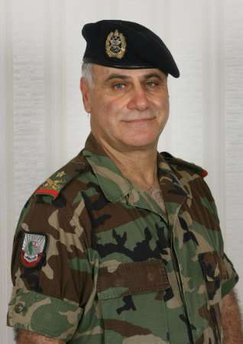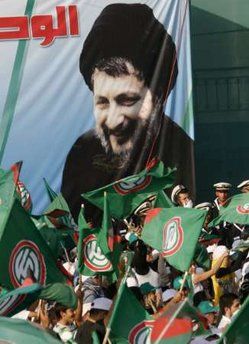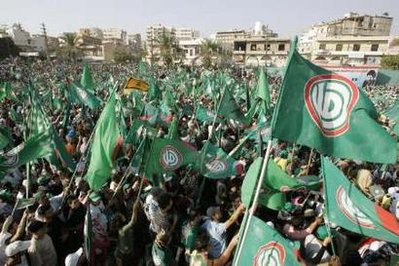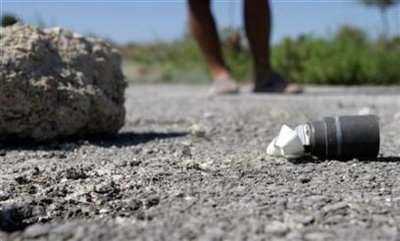 The new chief of the Lebanese army, Jean Kahwaji, has been promoted to general in a ceremony attended by his predecessor, President Michel Suleiman. Gen Kahwaji was appointed to the post at a meeting of the national unity government on Friday evening. The 54-year-old Maronite Christian had been a brigade commander since 2002. Many Lebanese regard the army as one of the country's few neutral institutions, and say it plays an important role in preventing sectarian conflict.
The new chief of the Lebanese army, Jean Kahwaji, has been promoted to general in a ceremony attended by his predecessor, President Michel Suleiman. Gen Kahwaji was appointed to the post at a meeting of the national unity government on Friday evening. The 54-year-old Maronite Christian had been a brigade commander since 2002. Many Lebanese regard the army as one of the country's few neutral institutions, and say it plays an important role in preventing sectarian conflict.
"The Council of Ministers decided to appoint General Jean Kahwaji to the post of chief of the Lebanese army," Mitri told reporters at the end of a cabinet meeting at the presidential palace. Kahwaji, 54, joined the army in 1973. He has undergone specialised military training abroad, including in the United States and Italy, while in 2006 he went to Germany for intensive anti-terrorism training. Decorated on several occasions, he has occupied the post of commander of the second infantry division since 2002. He is married with three children. General Shawki al-Masri, the army's chief of staff, had been acting as head of the army since Sleiman was elected president of Lebanon on May 25, ending a drawn-out political crisis in the country. Observers say the 60,000-strong majority Shiite Lebanese army is these days more of a peacekeeping unit than an offensive force. At the end of 2006, Sleiman claimed that the army was "unified" -- unlike it had been during the 1975-1990 civil war when it was bitterly divided along confessional lines.
 BEIRUT (AFP) - Several thousand people joined a rally in Lebanon on Sunday to mark 30 years since Shiite leader Mussa Sadr vanished without trace in Libya, with the circumstances of his disappearance as mysterious as ever. Sadr, who founded the opposition Amal movement now led by Parliament Speaker Nabih Berre would have been 80 this year and is still regarded by the Lebanese Shiite community as their key spiritual guide. Lebanon last week issued an arrest warrant for Libyan leader Moamer Kadhafi over the disappearance of the imam on August 31, 1978 while he was in Tripoli with two companions, who vanished with him. "We tell the leader of the Libyan regime Moamer Kadhafi: you are personally responsible for the disappearance of Imam Mussa Sadr," Berri said in a speech to the crowds in the southern town of Nabatiyeh."Let no-one think that we will forget or make any compromise," said Berri, a leading figure in the Syrian-backed opposition in Lebanon spearheaded by the powerful Hezbollah movement. Libya has denied involvement in Sadr's disappearance, saying he left Libya for Italy. But the Italian government has always denied he ever arrived there. However, in 2004 Italian authorities returned a passport found in Italy belonging to the imam.
BEIRUT (AFP) - Several thousand people joined a rally in Lebanon on Sunday to mark 30 years since Shiite leader Mussa Sadr vanished without trace in Libya, with the circumstances of his disappearance as mysterious as ever. Sadr, who founded the opposition Amal movement now led by Parliament Speaker Nabih Berre would have been 80 this year and is still regarded by the Lebanese Shiite community as their key spiritual guide. Lebanon last week issued an arrest warrant for Libyan leader Moamer Kadhafi over the disappearance of the imam on August 31, 1978 while he was in Tripoli with two companions, who vanished with him. "We tell the leader of the Libyan regime Moamer Kadhafi: you are personally responsible for the disappearance of Imam Mussa Sadr," Berri said in a speech to the crowds in the southern town of Nabatiyeh."Let no-one think that we will forget or make any compromise," said Berri, a leading figure in the Syrian-backed opposition in Lebanon spearheaded by the powerful Hezbollah movement. Libya has denied involvement in Sadr's disappearance, saying he left Libya for Italy. But the Italian government has always denied he ever arrived there. However, in 2004 Italian authorities returned a passport found in Italy belonging to the imam.
 Sunday marked 30 years since the disappearance of Imam Musa al-Sadr, a Lebanese icon who put his country's Shiite community on the road to sociopolitical revival long before the 1979 Islamic Revolution In Iran brought a more radical flavor to the phenomenon on the regional level. The details of Sadr's fate remain a mystery, but all signs point to the government of Libya, which is the last place where he was seen alive. Tripoli has staunchly - but not very convincingly - denied any involvement, preventing the two countries from improving their bilateral relationship and foiling any form of "closure" to many Lebanese Shiites who still believe that their hero continues to languish in captivity. As it happens, the anniversary followed just a day after visiting Italian Prime Minister Silvio Berlusconi performed a remarkable act of contrition in Benghazi, apologizing to all Libyans for his own country's colonial-era atrocities and pledging billions of dollars in investment as a mechanism of indirect compensation. But Moammar Gadhafi's regime need not look to Rome for an example of how to properly turn the page: In the past few years, his own government has closed several embarrassing files, including its efforts to develop weapons of mass destruction and the involvement of its intelligence officers in the 1988 Lockerbie airliner bombing. Sayyed Hassan Nasrallah, leader of Hizbullah, has invited the Libyans to come clean on Sadr's disappearance as well, and Tripoli could do itself a favor by accepting it. As demonstrated by last week's filing of charges against Gadhafi by a Lebanese prosecutor, this issue will not go away - particularly when Hizbullah and Amal, two Shiite parties that form a large part of Sadr's legacy, remain in ascendance.
Sunday marked 30 years since the disappearance of Imam Musa al-Sadr, a Lebanese icon who put his country's Shiite community on the road to sociopolitical revival long before the 1979 Islamic Revolution In Iran brought a more radical flavor to the phenomenon on the regional level. The details of Sadr's fate remain a mystery, but all signs point to the government of Libya, which is the last place where he was seen alive. Tripoli has staunchly - but not very convincingly - denied any involvement, preventing the two countries from improving their bilateral relationship and foiling any form of "closure" to many Lebanese Shiites who still believe that their hero continues to languish in captivity. As it happens, the anniversary followed just a day after visiting Italian Prime Minister Silvio Berlusconi performed a remarkable act of contrition in Benghazi, apologizing to all Libyans for his own country's colonial-era atrocities and pledging billions of dollars in investment as a mechanism of indirect compensation. But Moammar Gadhafi's regime need not look to Rome for an example of how to properly turn the page: In the past few years, his own government has closed several embarrassing files, including its efforts to develop weapons of mass destruction and the involvement of its intelligence officers in the 1988 Lockerbie airliner bombing. Sayyed Hassan Nasrallah, leader of Hizbullah, has invited the Libyans to come clean on Sadr's disappearance as well, and Tripoli could do itself a favor by accepting it. As demonstrated by last week's filing of charges against Gadhafi by a Lebanese prosecutor, this issue will not go away - particularly when Hizbullah and Amal, two Shiite parties that form a large part of Sadr's legacy, remain in ascendance.
 TYRE, Lebanon (Reuters) - Many of the 44 teams clearing cluster munitions scattered by Israel in south Lebanon during its 2006 war with Hezbolah will have to stop work this month for lack of funds, a U.N. spokeswoman said on Friday Donors have failed to come up with a promised $4.7 million needed to fund the program in 2008, according to Dalya Farran of the U.N. Mine Action Coordination Centre (UNMACC). "A very large number of the clearance teams will be stopping by the end of this month if we don't get funds before that," she said, adding that some donor countries had not kept their promises and others had lost interest two years after the war.
TYRE, Lebanon (Reuters) - Many of the 44 teams clearing cluster munitions scattered by Israel in south Lebanon during its 2006 war with Hezbolah will have to stop work this month for lack of funds, a U.N. spokeswoman said on Friday Donors have failed to come up with a promised $4.7 million needed to fund the program in 2008, according to Dalya Farran of the U.N. Mine Action Coordination Centre (UNMACC). "A very large number of the clearance teams will be stopping by the end of this month if we don't get funds before that," she said, adding that some donor countries had not kept their promises and others had lost interest two years after the war.
UNMACC has led efforts to clear thousands of unexploded cluster bomblets left over after Israel's war with Lebanese Hezbollah guerrillas. Israel fired or dropped most of the munitions in the last 72 hours before an August 14 ceasefire. Since then 27 civilians have been killed and 234 wounded by unexploded ordnance, mostly cluster munitions, while 13 bombs disposal experts have been killed and 39 wounded, Farran said. Any reduction in clearance work would lead to a higher accident rate because past experience shows that villagers will attempt to deal with the bomblets themselves if they believe that no disposal teams will do the job, Farran said.
DAMASCUS (AFP) – Syria and Lebanon agreed on Thursday to take formal steps to demarcate their borders as part of a string …
Khazen History


Historical Feature:
Churches and Monasteries of the Khazen family

St. Anthony of Padua Church in Ballouneh
Mar Abda Church in Bakaatit Kanaan
Saint Michael Church in Bkaatouta
Saint Therese Church in Qolayaat
Saint Simeon Stylites (مار سمعان العامودي) Church In Ajaltoun
Virgin Mary Church (سيدة المعونات) in Sheilé
Assumption of Mary Church in Ballouneh
1 - The sword of the Maronite Prince
2 - LES KHAZEN CONSULS DE FRANCE
3 - LES MARONITES & LES KHAZEN
4 - LES MAAN & LES KHAZEN
5 - ORIGINE DE LA FAMILLE
Population Movements to Keserwan - The Khazens and The Maans
ما جاء عن الثورة في المقاطعة الكسروانية
ثورة أهالي كسروان على المشايخ الخوازنة وأسبابها
Origins of the "Prince of Maronite" Title
Growing diversity: the Khazin sheiks and the clergy in the first decades of the 18th century
Historical Members:
Barbar Beik El Khazen [English]
Patriach Toubia Kaiss El Khazen(Biography & Life Part1 Part2) (Arabic)
Patriach Youssef Dargham El Khazen (Cont'd)
Cheikh Bishara Jafal El Khazen
Patriarch Youssef Raji El Khazen
The Martyrs Cheikh Philippe & Cheikh Farid El Khazen
Cheikh Nawfal El Khazen (Consul De France)
Cheikh Hossun El Khazen (Consul De France)
Cheikh Abou-Nawfal El Khazen (Consul De France)
Cheikh Francis Abee Nader & his son Yousef
Cheikh Abou-Kanso El Khazen (Consul De France)
Cheikh Abou Nader El Khazen
Cheikh Chafic El Khazen
Cheikh Keserwan El Khazen
Cheikh Serhal El Khazen [English]
Cheikh Rafiq El Khazen [English]
Cheikh Hanna El Khazen
Cheikha Arzi El Khazen
Marie El Khazen